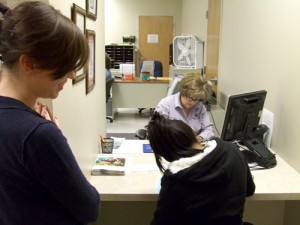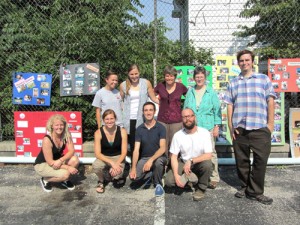Migrant Farmworkers Project
Kansas City, MO | www.migrantfarmworkersproject.org
Contact: Erin Bartling, Project Director; Suzanne Gladney, Founder & Immigration Attorney
When you access health care, what is your path? How would this path be different if you could not speak the language? What if you did not own a car or could not read public transportation signs? What if going to the doctor meant that you would lose a day of paid work? Accessing health care can be difficult. These challenges make it even more difficult. The Migrant Farmworkers Project (MFP) of Kansas City recognizes that without help, many farmworkers would not receive the health care they need. MFP’s Healthcare Case Management project provides outreach, healthcare case management, and follow-up to migrant and seasonal farmworker families. MFP approaches health holistically by providing social support services and accompanies patients through the entire pathway of care from beginning to end. According to MFP, the pathway of care encompasses the different steps a patient must take in order to reach health access.
 Each year, MFP’s healthcare case management project serves 300 to 500 migrant and seasonal farmworkers. Most farmworkers in Lafayette County (Lafco) are from Mexico, speak Spanish, and migrate for work. The migrant farmworkers return to Lafco each year for harvest season from August through October. MFP’s healthcare case management involves seven steps: 1). Outreach and individual assessment of health needs, 2). Assistance with appointment setting, 3). Obtaining health records, 4). Transportation to and from appointments, 5). Interpretation during appointments, 6). Referral navigation, and 7). Patient follow-up such as medication assistance and education.
Each year, MFP’s healthcare case management project serves 300 to 500 migrant and seasonal farmworkers. Most farmworkers in Lafayette County (Lafco) are from Mexico, speak Spanish, and migrate for work. The migrant farmworkers return to Lafco each year for harvest season from August through October. MFP’s healthcare case management involves seven steps: 1). Outreach and individual assessment of health needs, 2). Assistance with appointment setting, 3). Obtaining health records, 4). Transportation to and from appointments, 5). Interpretation during appointments, 6). Referral navigation, and 7). Patient follow-up such as medication assistance and education.
1). Outreach and individual assessment of health needs
MFP conducts 4 to 6 rounds of outreach when farmworkers arrive for the harvest season. Locations for outreach include migrant farmworker housing camps and food distribution events for seasonal farmworkers. During outreach events, MFP collects basic demographic information, documents individual farmworker health needs, and provides information about available services. Over the years, MFP has built strong relationships with orchard owners. The owners notify MFP as soon as farmworkers arrive. Most of the migrant farmworkers in Lafco return each year and already trust MFP. MFP anticipates the health issues of arriving farmworkers based on health records from previous years and prepares partnering clinics accordingly. Seven MFP staff conduct outreach and individual assessments of health needs each year.
2). Assistance with appointment setting
MFP has built a strong, long-term partnership with Lexington’s community health center. The health center provides an evening walk-in clinic for migrant and seasonal farmworkers during the harvest season. MFP has the ability to schedule and fill-in appointments. They also have the ability to schedule daytime appointments for farmworkers who need follow-up care. During the off-season, MFP schedules normal appointments for the seasonal farmworkers who stay in the area. Appointment setting is done during outreach once the health needs of a farmworker have been identified.
3). Obtaining health records
In addition to appointment setting, MFP also works with high-need patients to obtain their health record from other locations. In many cases, it can be difficult to get these health records before the farmworker migrates. MFP will pilot a partnership with Migrant Clinicians Network this season to collaborate with clinics and health centers to obtain records faster.
4). Transportation to and from appointments
Once farmworkers have appointments at the local community health center, MFP coordinates transportation to and from appointments. Transportation is one of the biggest barriers to care for the migrant and seasonal farmworkers in the area due to living in isolated areas without a means of transportation. MFP provides transportation for 70% of farmworkers with daytime appointments at the community health center with three MFP vehicles. A full time case manager coordinates transportation services while 3 part time case managers provide transportation and accompany, advocate for and interpret for farmworkers at their appointments.

5). Interpretation during appointments
MFP’s bilingual case managers receive Spanish bilingual assistance training for Spanish speaking medical interpreters. Farmworkers who require interpretation are accompanied to their appointments by a case manager. Case managers also help patients obtain medication, instruct patients on how to take medication, and work with them to settle any costs for their health care.
6). Referral navigation
If the farmworker has a specialist referral, MFP’s case managers assist in making the appointment and following-up with them. Case managers also assist in coordinating visits to obtain lab testing and any other needs, such as emotional or educational support around their health care.
7). Follow-up
In the final step of the pathway to care, MFP’s case managers follow-up with farmworkers about their health care. This follow-up may entail coordinating additional appointments as needed, education around adhering to medication, or support with using medical equipment or lifestyle changes to maintain health.
MFP’s team consists of 7 full time staff and 3 part time staff. Full time staff at MFP provide social services, outreach, and support the healthcare case management team as needed. MFP’s full time Healthcare Case Manager coordinates case management activities with the support of the 3 part time, bilingual case managers. All MFP staff receive most of their training on the job. Case managers receive additional training in medical interpretation and have the opportunity to attend the National Center for Farmworker Health’s Midwest Stream Farmworker Health Forum.[1]
Evaluation involves bi-annual meetings with partners before and after each harvest season to discuss successes and challenges. MFP then works with their partners to adjust programs accordingly.
 MFP encourages others to consider comprehensive healthcare case management at their organizations. To do this, examine the path to healthcare for the priority population, consider how the priority population experiences this pathway, and build programs around needs and challenges they face on their pathway. MFP has learned through their strong collaboration with the local community health center that it is important to effectively communicate with partners about expectations. Partners should know what they can expect from the collaborating organization and what is expected of them. Effective communication, including addressing problems as they arise, will yield a positive working relationship.
MFP encourages others to consider comprehensive healthcare case management at their organizations. To do this, examine the path to healthcare for the priority population, consider how the priority population experiences this pathway, and build programs around needs and challenges they face on their pathway. MFP has learned through their strong collaboration with the local community health center that it is important to effectively communicate with partners about expectations. Partners should know what they can expect from the collaborating organization and what is expected of them. Effective communication, including addressing problems as they arise, will yield a positive working relationship.
“Don’t be intimidated by it. Don’t be afraid to try. You learn a lot about people’s needs in terms of health care if you take a holistic approach.”
MFP is funded by a variety of grants and donations, which can be found on their website at www.migrantfarmworkersproject.org/our-funding.html. MFP’s healthcare case management project is primarily funded by the Health Care Foundation of Greater Kansas City, private donations, and support from Catholic Charities.
[1] East Coast and West Coast health centers and community-based organizations can attend the East Coast Migrant Stream Forum (www.ncchca.org) and the Western Forum for Migrant and Community Health (www.nwrpca.org), respectively.
